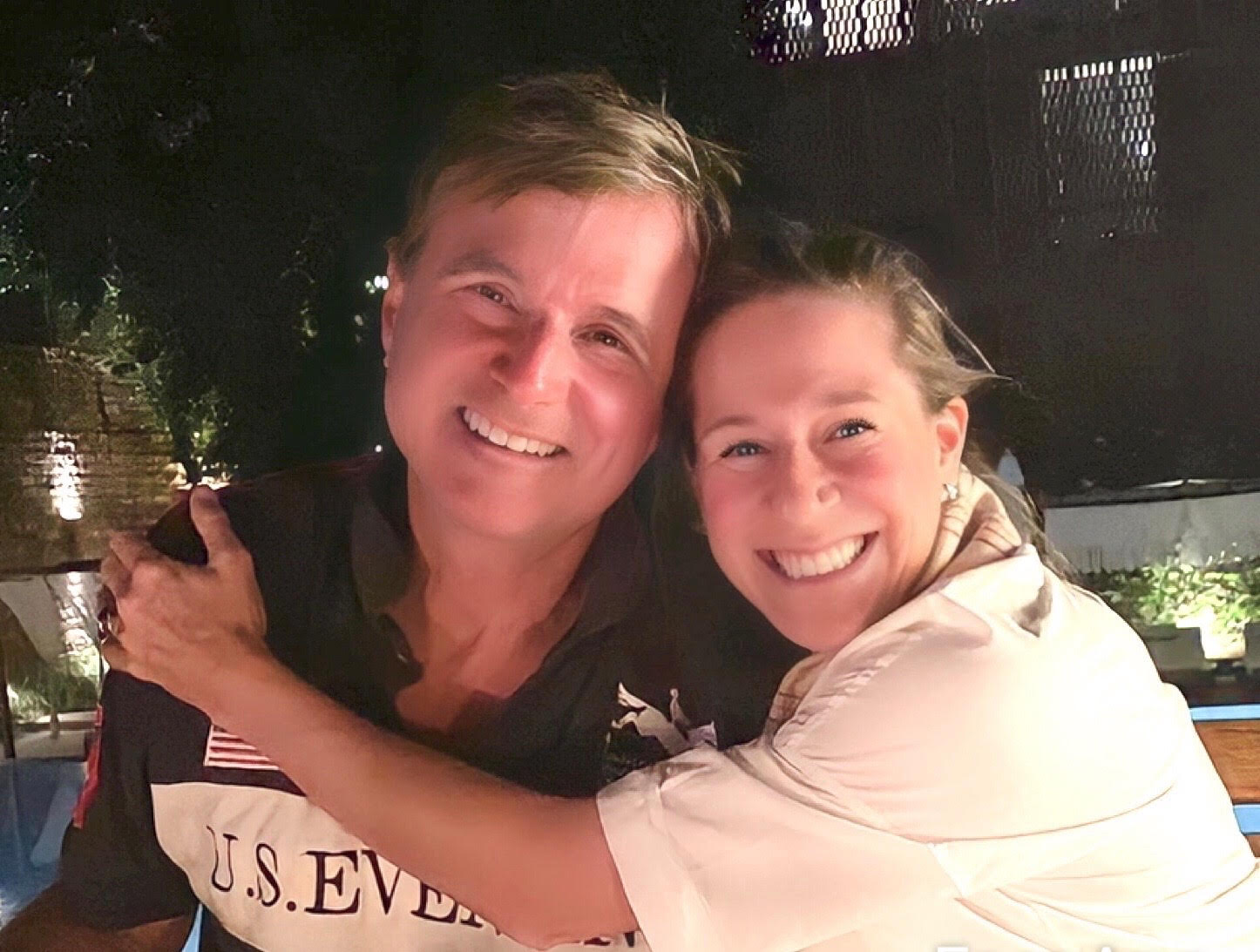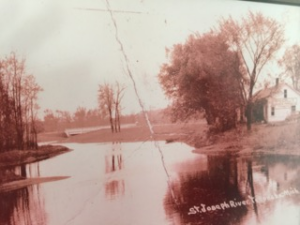
Scott and Meredith Keating, proud owners and operators of Randall Beans.
About Us
The Story of Randall Beans: In The Beginning
Randall Beans started out about 150 years ago as Randall Chicken Products Company in Tekonsha, Michigan. The company’s founders were poultry farmers, so they offered a variety of poultry, pheasant, and even chicken and noodle dinners in those sturdy glass jars.
A few years back, we received a lovely letter from the great-grandson, Scott Randall, one of the original owners of Randall Beans. He shared his memories of working in the factory as a teenager and how much he loved the business his great-grandparents built.
Scott also shared some pictures with us. The first picture shows the founders of Randall Beans standing in front of the Randall factory. According to Scott, his great-grandmother, Dawne, worked in the factory until the day she died in 1971 at the age of 82.

Left to right, Scott, Harvey, Howard, and Dawne Randall
This next picture shows the original Randall’s Food Processing Plant. During World War II, Randall had a federal contract to process water.
As we mention above, the Randall Food Processing Plant first canned chicken products in glass jars. By the early 1960s, farm crops such as grains surpassed poultry farming as the main product of the Tekonsha area, so the family company managers decided to form a bean division.
The response to their first product, Great Northern beans, was enthusiastic, to say the least. In the early 1960s, the Randall family decided to add beans to their product line while they also continued producing chicken.
Due to the popularity of the Great Northern beans, Randall discontinued the poultry products in 1968 and focused exclusively on beans, using Grandma Randall’s recipe that was created in the late 1800s.
Original Randall Foods Processing Plant
We clearly display that unctuousness in our unique glass jars, which we use to make sure you can see what you’re buying and to provide the most natural taste possible. We make them just like you would to help you save time.
The early product labels boldly proclaimed that those signature glass jars contained “No tomato – no molasses – no mustard, but delicately seasoned ready for baking, for soup, or to eat right from the jar.”
During this period, Randall Beans added pinto beans to their product line, featuring the same delicious taste, unique appearance, wholesomeness, and overall quality that customers had come to love in their Great Northern beans.
The Middle Years
In 1974, after four generations of successful ownership, Harvey and Scott Randall decided to sell the business to Meredith’s father, W. O. (Bill) Mashburn, III, the former president of the Cleveland Coca-Cola Bottling Company. After tapping into some family inheritance money—and promising that his children would have equal shares in the company—Bill acquired all of the operating assets of Randall Chicken Products and its Randall Bean division.
Bill changed the name of the company to Randall Food Products, Inc., and moved the company headquarters in 1977 to Pepper Pike, Ohio. The company eventually settled its headquarters in Cincinnati. But it has remained fully committed to the Tekonsha production site, which is located less than five miles from the intersection of Interstate 69 and Interstate 94.
Tekonsha residents are the backbone of the company’s conscientious and loyal workforce. (Tekonsha is a wonderful small town with about 700 residents.)
In 1984, Lori Arkin joined the business. She would go on to become the company’s “administrative guru” in the downtown Cincinnati office.
At the time Lori was hired, the company had only two products—Great Northern Beans and Pinto Beans—in just one 48oz size and had sales of about $1 million.
When a competitor—Hurst Beans—released a new mixed bean product, Randall Beans developed its famous Randall Deluxe Bean Mix with seven delicious types of beans. The deluxe mix was so well-received that Hearst agreed to partner with Randall and begin selling the same Randall bean mix under the Hearst label.
When Bill acquired the business in 1974, the company was debt-free. He ran it successfully for several decades and managed to pass a company that was still debt-free down to his daughter and her husband.
The Present
Scott and Meredith Keating acquired the company in 2011. They bought it for a number of reasons.
One reason was that Meredith had grown up with it. The company had been in her family since the seventies, and she knew it was a strong company built on a good foundation.
Scott also had his own reasons for wanting to take over Randall Beans. He’d been teaching business classes at MIT and wanted to put his knowledge and expertise to the test in the real world. Would the principles he taught on a regular basis hold up when he used them within his own company? He decided to find out.
After acquiring the company, Scott and Meredith quickly faced the fact that they’d need to cut costs if they wanted to continue growing. Rather than letting go of any employees, they focused on updating technology and processes that would lead to better efficiency. For example, they streamlined an incredibly cumbersome ordering process that relied on faxes, snail mail, and paper checks, and found cloud-based solutions and better shipping methods. They also updated packaging, started selling online, and introduced new bean products. Today, they are still steadily expanding geographical availability.
Together, Scott and Meredith paid off a 10-year loan in nine and a half years. They also equipped the plant with modern technology that helps workers to be more productive and—perhaps most importantly—built a company culture that lets every employee know they are and will always be a valued part of the team.
When Randall Food Products, Inc. was acquired, the Randall line of beans was sold in Indiana, Iowa, Kentucky, Michigan, and Ohio. In fact, 60 percent of its sales were in Michigan alone.
Now, their bean products are also sold to leading grocery chains such as Kroger, Walmart, and Meijer, plus wholesalers and other grocers in Illinois, Indiana, Iowa, Kentucky, Michigan, Minnesota, Nebraska, Ohio, South Dakota, Tennessee, Western New York, Western Pennsylvania, Virginia, West Virginia, and Wisconsin. With plenty more to come!
We are absolutely dedicated to producing the healthiest, purest beans you can find. One of our customers, recently interviewed by an independent research firm, said, “They’re awesome. They’ve got their recipe just right.”
Grandma Randall would be proud, as we haven’t deviated from her perfect beans since she made them for her family when they went off on adventures. Another principle we’ve upheld over the years is the goal of providing “Great Meals In Minutes,” as Meredith’s father used to say.
We always try to go above and beyond to provide not only delicious, healthy beans but also mouthwatering recipes to go along with them!
From Strangers to Neighbors
Scott and Meredith have extended their love of natural and organic products to Open Spigot Farm, located in the Great Smoky Mountains in east Tennessee. The farm has existed for 150 years and was known as a welcoming watering stop for neighbors passing through with their cattle.
About 15 years ago, Scott and Meredith wanted to buy a farm where they could experiment with bean field pea seed-saving; some of the beans planted and harvested on the farm are from the late 1700s. Scott and Meredith knew that Appalachia was a very fertile farming region, so they sought out an area to farm beans and continue to be good stewards of the earth. They traveled to east Tennessee and were immediately enchanted with the beauty of the mountains.
A local lady invited Scott and Meredith to take a drive “up the hill” with her. A farm waited just over the hill, and that’s all it took to win Scott and Meredith over. The farm was for sale, but with the condition that it could not be sold in smaller parcels and it could not be developed.
Scott and Meredith assured the owners, who exhibited the traditional Appalachian wariness of “outsiders,” that they wanted a farm to grow organic crops. The deal was sealed.
Although they still occasionally hear, “You’re not from around here, are you?” Scott and Meredith continue the tradition of welcoming their neighbors and community to the farm when they begin harvesting each year’s crops, which they sell on the farm. Farming and ecology is a passion for them.
And as a little romantic aside, the farm is called “Open Spigot” because, as they were trying to think of the right name, Meredith remembered that Scott liked to say that his love for her was an open spigot. So there you go.
